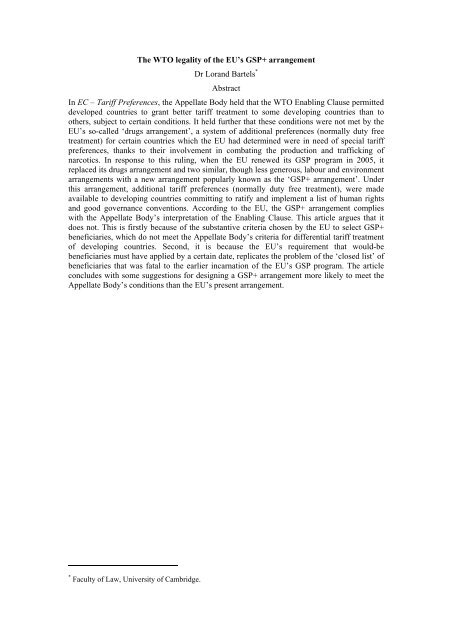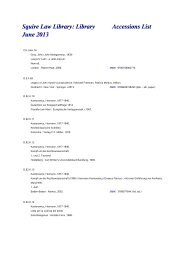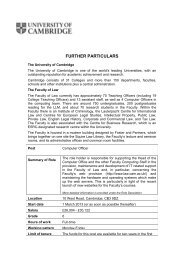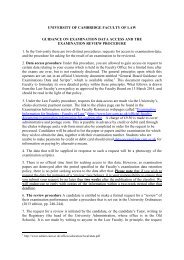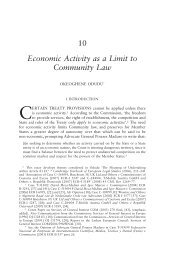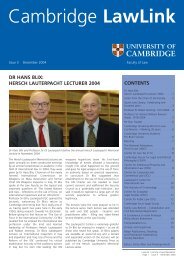The WTO legality of the EU's GSP+ arrangement Dr Lorand Bartels ...
The WTO legality of the EU's GSP+ arrangement Dr Lorand Bartels ...
The WTO legality of the EU's GSP+ arrangement Dr Lorand Bartels ...
You also want an ePaper? Increase the reach of your titles
YUMPU automatically turns print PDFs into web optimized ePapers that Google loves.
<strong>The</strong> <strong>WTO</strong> <strong>legality</strong> <strong>of</strong> <strong>the</strong> EU’s <strong>GSP+</strong> <strong>arrangement</strong><strong>Dr</strong> <strong>Lorand</strong> <strong>Bartels</strong> *AbstractIn EC – Tariff Preferences, <strong>the</strong> Appellate Body held that <strong>the</strong> <strong>WTO</strong> Enabling Clause permitteddeveloped countries to grant better tariff treatment to some developing countries than too<strong>the</strong>rs, subject to certain conditions. It held fur<strong>the</strong>r that <strong>the</strong>se conditions were not met by <strong>the</strong>EU’s so-called ‘drugs <strong>arrangement</strong>’, a system <strong>of</strong> additional preferences (normally duty freetreatment) for certain countries which <strong>the</strong> EU had determined were in need <strong>of</strong> special tariffpreferences, thanks to <strong>the</strong>ir involvement in combating <strong>the</strong> production and trafficking <strong>of</strong>narcotics. In response to this ruling, when <strong>the</strong> EU renewed its GSP program in 2005, itreplaced its drugs <strong>arrangement</strong> and two similar, though less generous, labour and environment<strong>arrangement</strong>s with a new <strong>arrangement</strong> popularly known as <strong>the</strong> ‘<strong>GSP+</strong> <strong>arrangement</strong>’. Underthis <strong>arrangement</strong>, additional tariff preferences (normally duty free treatment), were madeavailable to developing countries committing to ratify and implement a list <strong>of</strong> human rightsand good governance conventions. According to <strong>the</strong> EU, <strong>the</strong> <strong>GSP+</strong> <strong>arrangement</strong> complieswith <strong>the</strong> Appellate Body’s interpretation <strong>of</strong> <strong>the</strong> Enabling Clause. This article argues that itdoes not. This is firstly because <strong>of</strong> <strong>the</strong> substantive criteria chosen by <strong>the</strong> EU to select <strong>GSP+</strong>beneficiaries, which do not meet <strong>the</strong> Appellate Body’s criteria for differential tariff treatment<strong>of</strong> developing countries. Second, it is because <strong>the</strong> EU’s requirement that would-bebeneficiaries must have applied by a certain date, replicates <strong>the</strong> problem <strong>of</strong> <strong>the</strong> ‘closed list’ <strong>of</strong>beneficiaries that was fatal to <strong>the</strong> earlier incarnation <strong>of</strong> <strong>the</strong> EU’s GSP program. <strong>The</strong> articleconcludes with some suggestions for designing a <strong>GSP+</strong> <strong>arrangement</strong> more likely to meet <strong>the</strong>Appellate Body’s conditions than <strong>the</strong> EU’s present <strong>arrangement</strong>.* Faculty <strong>of</strong> Law, University <strong>of</strong> Cambridge.
<strong>The</strong> <strong>WTO</strong> <strong>legality</strong> <strong>of</strong> <strong>the</strong> EU’s <strong>GSP+</strong> <strong>arrangement</strong><strong>Dr</strong> <strong>Lorand</strong> <strong>Bartels</strong> *In EC – Tariff Preferences, <strong>the</strong> Appellate Body held that <strong>the</strong> <strong>WTO</strong> Enabling Clause permitteddeveloped countries to grant better tariff treatment to some developing countries than too<strong>the</strong>rs, subject to certain conditions. 1 It held fur<strong>the</strong>r that <strong>the</strong>se conditions were not met by <strong>the</strong>EU’s so-called ‘drugs <strong>arrangement</strong>’, a system <strong>of</strong> additional preferences (normally duty freetreatment) for certain countries which <strong>the</strong> EU had determined were in need <strong>of</strong> special tariffpreferences, thanks to <strong>the</strong>ir involvement in combating <strong>the</strong> production and trafficking <strong>of</strong>narcotics. 2 In response to this ruling, when <strong>the</strong> EU renewed its GSP program in 2005, itreplaced its drugs <strong>arrangement</strong> and two similar, though less generous, labour and environment<strong>arrangement</strong>s 3 with a new <strong>arrangement</strong> popularly known as <strong>the</strong> ‘<strong>GSP+</strong> <strong>arrangement</strong>’. 4 Underthis <strong>arrangement</strong>, additional tariff preferences (normally duty free treatment), were madeavailable to developing countries committing to ratify and implement a list <strong>of</strong> human rightsand good governance conventions. One <strong>of</strong> <strong>the</strong> conditions was that <strong>the</strong>se countries had to applyby 31 October 2005, which was four months after <strong>the</strong> publication <strong>of</strong> <strong>the</strong> GSP Regulation. <strong>The</strong>new <strong>arrangement</strong> applies from 1 January 2006 to 31 December 2008. 5According to <strong>the</strong> EU, <strong>the</strong> <strong>GSP+</strong> <strong>arrangement</strong> complies with <strong>the</strong> Appellate Body’sinterpretation <strong>of</strong> <strong>the</strong> Enabling Clause. This article argues that it does not. This is firstlybecause <strong>of</strong> <strong>the</strong> substantive criteria chosen by <strong>the</strong> EU to select <strong>GSP+</strong> beneficiaries, which donot meet <strong>the</strong> Appellate Body’s criteria for differential tariff treatment <strong>of</strong> developing countries.Second, it is because <strong>the</strong> EU’s requirement that would-be beneficiaries must have applied bya certain date, replicates <strong>the</strong> problem <strong>of</strong> <strong>the</strong> ‘closed list’ <strong>of</strong> beneficiaries that was fatal to <strong>the</strong>earlier incarnation <strong>of</strong> <strong>the</strong> EU’s GSP program.* Faculty <strong>of</strong> Law, University <strong>of</strong> Cambridge; presently Humboldt Fellow at <strong>the</strong> Max Planck Institute forInternational Law in Heidelberg. This article has benefited greatly from comments and criticisms fromRobert Howse, Joost Pauwelyn, Melaku Geboya Desta, Gustavo Ribiero, Bryan Mercurio, FedericoOrtino, Nathalie Bernasconi, Margaret Young and Holger Hestermeyer and from <strong>the</strong> participants at <strong>the</strong>Conference on <strong>WTO</strong> and Human Rights, Monash University Prato Centre, 21-22 June 2007.1 <strong>WTO</strong> Appellate Body Report, EC – Tariff Preferences, WT/DS246/AB/R, adopted 20 April 2004.2 See below at n 17.3 Council Regulation 2501/2001 [2001] OJ L346/1. For discussion see <strong>Lorand</strong> <strong>Bartels</strong>, ‘<strong>The</strong> <strong>WTO</strong>Enabling Clause and Positive Conditionality in <strong>the</strong> European Community’s GSP Program’ 6 JIEL 507(2003).4 Arts 8-11 <strong>of</strong> Council Regulation 980/2005 <strong>of</strong> 27 June 2005 [2005] OJ L169/1. All fur<strong>the</strong>r referencesto Articles are to this Regulation unless specified o<strong>the</strong>rwise. <strong>The</strong> legislative history <strong>of</strong> <strong>the</strong> regulation isas follows. A first proposal was set out in Commission Communication, Developing countries,international trade and sustainable development: <strong>the</strong> function <strong>of</strong> <strong>the</strong> Community’s generalised system<strong>of</strong> preferences (GSP) for <strong>the</strong> ten-year period from 2006 to 2015, COM (2004) 461, 7.7.2004, in which<strong>the</strong> <strong>GSP+</strong> <strong>arrangement</strong> was outlined in general terms, and to begin on 1 January 2006. This wasfollowed by a concrete Proposal for a Council Regulation applying a scheme <strong>of</strong> generalised tariffpreferences, COM (2004) 699, 20.10.2004, now to commence on 1 July 2005. In its Amended Proposalfor a Council Regulation applying a scheme <strong>of</strong> generalised tariff preferences, COM (2005) 43,10.2.2005, <strong>the</strong> Commission proposed to bring forward <strong>the</strong> commencement date to 1 April 2005, inorder to assist countries affected by <strong>the</strong> recent tsunami, with a <strong>GSP+</strong> application date <strong>of</strong> 31 May 2005.This Proposal was not adopted, and is not referred to in <strong>the</strong> GSP Regulation.5 Art 30(2) provides that <strong>the</strong> GSP Regulation shall apply until 31 December 2008, but also (and a littleambiguously) that this date ‘shall not apply to <strong>the</strong> <strong>arrangement</strong>s for least-developed countries’.2
are also now joined by Sri Lanka, Moldova, Georgia and Mongolia, 18 making fifteen <strong>GSP+</strong>beneficiaries in total. Of <strong>the</strong>se four countries, <strong>the</strong> first two were existing beneficiaries <strong>of</strong> <strong>the</strong>EU’s labour <strong>arrangement</strong>s, while <strong>the</strong> last two were in <strong>the</strong> process <strong>of</strong> applying for <strong>the</strong>sepreferences. 19 This means that, with <strong>the</strong> exception <strong>of</strong> Pakistan and with <strong>the</strong> addition <strong>of</strong> twoapplicants, <strong>the</strong> beneficiaries <strong>of</strong> <strong>the</strong> EU’s new <strong>GSP+</strong> <strong>arrangement</strong> are <strong>the</strong> same as <strong>the</strong>beneficiaries <strong>of</strong> its former drugs and labour <strong>arrangement</strong>s. 20II.<strong>WTO</strong> rules<strong>The</strong> <strong>WTO</strong> rules applicable to GSP programs are set out in <strong>the</strong> 1979 Enabling Clause 21 (nowpart <strong>of</strong> <strong>the</strong> GATT 1994). 22 <strong>The</strong> Enabling Clause states that <strong>the</strong> most-favoured-nationobligation in Article I GATT is not applicable to <strong>the</strong> grant <strong>of</strong> preferences by developed <strong>WTO</strong>Members to developing countries in accordance with <strong>the</strong> Generalized System <strong>of</strong> Preferencesas described in <strong>the</strong> 1971 GSP Decision <strong>of</strong> <strong>the</strong> GATT Contracting Parties. 23 As a result,preferences under <strong>the</strong> Enabling Clause must be ‘generalized, non-reciprocal and nondiscriminatory’.24In EC – Tariff Preferences, India argued that <strong>the</strong> reference to ‘non-discriminatory’preferences in <strong>the</strong> Enabling Clause meant that no difference in treatment between developingcountries was permitted. 25 <strong>The</strong> Appellate Body rejected this argument, stating that ‘non-Regulation 3282/94 [1994] OJ L348/57. From 1 July 1999, all <strong>of</strong> <strong>the</strong>se countries received duty freeaccess on most industrial and agricultural products: Council Regulation 2820/98 [1998] OJ L357/1. On14 November 2001, <strong>the</strong> European Commission proposed adding Pakistan to <strong>the</strong> list <strong>of</strong> ‘drugs<strong>arrangement</strong>’, and this was effected in <strong>the</strong> new GSP Program as <strong>of</strong> 1 January 2002: Council Regulation2501/2001, above at n 3. <strong>The</strong> EU’s rationale was that as a result <strong>of</strong> <strong>the</strong> events <strong>of</strong> 11 September 2001,including increased refugee flows, Pakistan’s campaign against illicit drugs needed to be supported,and that ‘[t]he GSP drug regime is <strong>the</strong>refore likely to stabilise its economic and social structures andthus consolidate <strong>the</strong> institutions that uphold <strong>the</strong> rule <strong>of</strong> law’. See <strong>the</strong> Explanatory Memorandum to <strong>the</strong>Amended Proposal for a Council Regulation applying a scheme <strong>of</strong> generalised tariff preferences for <strong>the</strong>period 1 January 2002 to 31 December 2004, COM (2001) 688, 14.11.2001. It was <strong>the</strong> addition <strong>of</strong>Pakistan to <strong>the</strong> list <strong>of</strong> ‘drugs <strong>arrangement</strong>’ beneficiaries that sparked India’s complaint in EC – TariffPreferences.18 Commission Decision 924/2005 <strong>of</strong> 21 December 2005 [2005] OJ L337/50. According to Art 11(3),this Decision was supposed to have been published by 15 December 2005.19Commission Regulation 1649/2000 (Moldova) [2000] OJ L189/13, Commission Regulation2342/2003 (Sri Lanka) [2003] OJ L346/34; Notice regarding request (Mongolia) [2004] OJ C243/2;Notice regarding request (Georgia) [2001] OJ 2001 C127/13.20 This is not however to say that <strong>the</strong>se countries were automatically granted <strong>the</strong> benefits. In terms <strong>of</strong><strong>the</strong> mandatory List A conventions, <strong>of</strong> <strong>the</strong> fifteen beneficiaries, only five (Costa Rica, Ecuador, Panama,Peru and Sri Lanka) had ratified all <strong>of</strong> <strong>the</strong> required human rights conventions before <strong>the</strong> <strong>arrangement</strong>was announced. Eight beneficiaries (Bolivia, Colombia, Georgia, Guatemala, Honduras, Moldova,Nicaragua and Venezuela) needed to ratify one outstanding convention, and two (Mongolia and ElSalvador) needed to ratify two. I am extremely grateful to Gustavo Ribiero for sharing his data on this.21 Differential and More Favourable Treatment, Reciprocity and Fuller Participation <strong>of</strong> DevelopingCountries (‘Enabling Clause’), Decision <strong>of</strong> 28 November 1979, GATT Doc L/4903.22 <strong>WTO</strong> Appellate Body Report, EC – Tariff Preferences, para 90.23 Generalized System <strong>of</strong> Preferences, Decision <strong>of</strong> 25 June 1971, GATT Doc L/3545.24 <strong>WTO</strong> Appellate Body Report, EC – Tariff Preferences, paras 145-147.25 <strong>The</strong> case is discussed in Steve Charnovitz et al, ‘<strong>The</strong> Appellate Body’s GSP Decision (InternetRoundtable)’ 3 World Trade Review 239 (2004), <strong>Lorand</strong> <strong>Bartels</strong>, ‘<strong>The</strong> <strong>WTO</strong> Ruling on EC - TariffPreferences to Developing Countries and its Implications for Conditionality in GSP Programmes’,Gregory Shaffer and Yvonne Apea, ‘GSP Programmes and <strong>The</strong>ir Historical-Political-InstitutionalContext’ and Jane Bradley, ‘<strong>The</strong> Enabling Clause and Applied Rules <strong>of</strong> Interpretation’, all published inThomas Cottier et al (eds), Human Rights and International Trade (Oxford: OUP, 2005), and GeneGrossman and Alan Sykes, ‘A Preference for Development: <strong>the</strong> Law and Economics <strong>of</strong> GSP’ 4 WorldTrade Review 41 (2005).4
discriminatory’ does not require identical treatment <strong>of</strong> all developing countries; ra<strong>the</strong>r,additional preferences may be made available to developing countries that share <strong>the</strong> same‘development, financial or trade need’. 26 <strong>Dr</strong>awing on o<strong>the</strong>r provisions <strong>of</strong> <strong>the</strong> Enabling Clause,<strong>the</strong> Appellate Body also set out fur<strong>the</strong>r conditions for any such differential treatment: first, <strong>the</strong>identified ‘development, financial and trade need’ must meet an ‘objective standard’. <strong>The</strong>Appellate Body added that ‘[b]road-based recognition [as] set out in <strong>the</strong> <strong>WTO</strong> Agreement orin multilateral instruments adopted by international organizations, could serve as such astandard’. 27 Second, <strong>the</strong> identified need ‘must by its nature, be such that it can be effectivelyaddressed through tariff preferences’. Third, on <strong>the</strong> facts <strong>of</strong> <strong>the</strong> case, ‘a sufficient nexusshould exist between, on <strong>the</strong> one hand, <strong>the</strong> preferential treatment provided … and, on <strong>the</strong>o<strong>the</strong>r, hand, <strong>the</strong> likelihood <strong>of</strong> alleviating <strong>the</strong> relevant “development, financial [or] tradeneed”.’ 28As it happened, it was unnecessary for <strong>the</strong> Appellate Body to determine whe<strong>the</strong>r <strong>the</strong> drugs<strong>arrangement</strong> at issue met <strong>the</strong>se conditions, because this <strong>arrangement</strong> was operated through a‘closed list’. On this, <strong>the</strong> Appellate Body said as follows:We find that <strong>the</strong> measure at issue fails to meet this requirement for <strong>the</strong> followingreasons. First, as <strong>the</strong> European Communities itself acknowledges, according benefitsunder <strong>the</strong> <strong>Dr</strong>ug Arrangements to countries o<strong>the</strong>r than <strong>the</strong> 12 identified beneficiarieswould require an amendment to <strong>the</strong> Regulation … Secondly, <strong>the</strong> Regulation containsno criteria or standards to provide a basis for distinguishing beneficiaries under <strong>the</strong><strong>Dr</strong>ug Arrangements from o<strong>the</strong>r GSP beneficiaries. 29Whe<strong>the</strong>r or not, aside from this administrative aspect, <strong>the</strong> drugs regime would have met <strong>the</strong>o<strong>the</strong>r conditions set by <strong>the</strong> Appellate Body is debatable. Even if <strong>the</strong> tariff preferences under<strong>the</strong> drugs <strong>arrangement</strong> could, in principle, have been able to respond to <strong>the</strong> relevant‘development needs’ <strong>of</strong> <strong>the</strong> beneficiary countries by encouraging substitute crops, it seemsthat in fact <strong>the</strong>y did not. As <strong>the</strong> EU’s European Economic and Social Committee observed,‘<strong>the</strong>re is no evidence that <strong>the</strong> special incentive <strong>arrangement</strong>s for combating <strong>the</strong> production andtrafficking <strong>of</strong> drugs … has had any impact whatsoever on <strong>the</strong> drug trade.’ 30III.Application <strong>of</strong> <strong>WTO</strong> rules to <strong>GSP+</strong> <strong>arrangement</strong><strong>The</strong> argument in this article is that <strong>the</strong> <strong>GSP+</strong> <strong>arrangement</strong> violates <strong>the</strong> conditions in <strong>the</strong>Enabling Clause, as interpreted by <strong>the</strong> Appellate Body. This is for <strong>the</strong> following reasons.26 <strong>WTO</strong> Appellate Body Report, EC – Tariff Preferences, para 165.27 Ibid, para 163.28 Ibid, para 164.29 Ibid, paras 187-8.30 Opinion <strong>of</strong> <strong>the</strong> European Economic and Social Committee on <strong>the</strong> ‘generalised system <strong>of</strong> preferences(GSP)’, adopted 25 February 2004 [2004] OJ C110/34, para 6.6.2. But overall benefits do apparentlyaccrue to <strong>GSP+</strong> beneficiaries: see Maria Persson, ‘Everything but <strong>Dr</strong>ugs: Export Effects <strong>of</strong> <strong>the</strong>European Union Trade Preferences for <strong>Dr</strong>ug Producing and Least Developed Countries’, WorkingPaper, Swedish Network for European Studies in Economics and Business, undated, available atwww.snee.org/filer/papers/251.pdf (visited 25 July 2007). By contrast, <strong>the</strong> benefits <strong>of</strong> general GSP<strong>arrangement</strong>s are far less certain: Persson, ibid, Grossman and Sykes, above at n 25; and Çaglar Özdenand Eric Reinhardt, ‘<strong>The</strong> Perversity <strong>of</strong> Preferences: GSP and Developing Country Trade Policies,1976–2000’ 78 Journal <strong>of</strong> Development Economics 1 (2005).5
A. <strong>The</strong> conventions1. ‘Development, financial and trade needs’In Recital 7 to <strong>the</strong> GSP Regulation, <strong>the</strong> EU gives <strong>the</strong> following rationale for its <strong>GSP+</strong>preferences:<strong>The</strong> special incentive <strong>arrangement</strong> for sustainable development and good governanceis based on an integral concept <strong>of</strong> sustainable development as recognized byinternational conventions and instruments such as <strong>the</strong> UN Declaration on <strong>the</strong> Right toDevelopment <strong>of</strong> 1986, <strong>the</strong> Rio Declaration on Environment and Development <strong>of</strong>1992, <strong>the</strong> ILO Declaration on Fundamental Principles and Rights at Work <strong>of</strong> 1998,<strong>the</strong> UN Millennium Declaration <strong>of</strong> 2000 and <strong>the</strong> Johannesburg Declaration onSustainable Development <strong>of</strong> 2002.Consequently, developing countries which due to a lack <strong>of</strong> diversification andinsufficient integration into <strong>the</strong> international trading system are vulnerable whileassuming special burdens and responsibilities due to <strong>the</strong> ratification and effectiveimplementation <strong>of</strong> core international conventions on human and labour rights,environmental protection and good governance should benefit from additional tariffpreferences. <strong>The</strong>se preferences are designed to promote fur<strong>the</strong>r economic growth and<strong>the</strong>reby to respond positively to <strong>the</strong> need for sustainable development. … (emphasisadded)In summary, <strong>the</strong> EU’s <strong>GSP+</strong> preferences are designed to compensate countries for ‘assumingspecial burdens and responsibilities due to <strong>the</strong> ratification and effective implementation <strong>of</strong>core international conventions’ by ‘promot[ing] fur<strong>the</strong>r economic growth and <strong>the</strong>reby …respond[ing] positively to <strong>the</strong> need for sustainable development’. This is more easilyunderstood when turned around: additional preferences will lead to ‘economic growth’ forcertain countries, this being compensation for <strong>the</strong> expense incurred by those countries when(voluntarily) <strong>the</strong>y seek to improve <strong>the</strong>ir ‘need for sustainable development’ by ratifying andimplementing <strong>the</strong> listed conventions. It is not entirely easy to identify <strong>the</strong> ‘development,financial or trade need’ in this rationale. On <strong>the</strong> one hand, it seems to be consideredequivalent to <strong>the</strong> ‘need for sustainable development’, while on <strong>the</strong> o<strong>the</strong>r it seems more limitedto <strong>the</strong> expense involved in seeking to improve this ‘need’. None<strong>the</strong>less, it is not necessary toattempt to parse <strong>the</strong>se possibilities, as <strong>the</strong> EU’s rationale is in any case <strong>of</strong> secondaryimportance in determining <strong>the</strong> <strong>legality</strong> <strong>of</strong> <strong>the</strong> EU’s <strong>GSP+</strong> <strong>arrangement</strong>.<strong>The</strong> proper approach to this question is to begin with first principles: to interpret <strong>the</strong> meaning<strong>of</strong> <strong>the</strong> treaty term ‘development need’ 31 in its legally relevant context. 32 This, as US – Shrimpmade clear, includes <strong>the</strong> acknowledgement, in <strong>the</strong> Preamble to <strong>the</strong> <strong>WTO</strong> Agreement, <strong>of</strong> <strong>the</strong>objective <strong>of</strong> ‘sustainable development’, 33 and, as <strong>the</strong> Appellate Body did in that case, it seemsappropriate to look to o<strong>the</strong>r legal instruments to gain an understanding <strong>of</strong> <strong>the</strong> current meaning<strong>of</strong> <strong>the</strong> concept <strong>of</strong> ‘development need’. A good starting point would seem to be <strong>the</strong> 1986 UNDeclaration on <strong>the</strong> Right to Development, which stated that ‘development is a comprehensiveeconomic, social, cultural and political process, which aims at <strong>the</strong> constant improvement <strong>of</strong><strong>the</strong> well-being <strong>of</strong> <strong>the</strong> entire population and <strong>of</strong> all individuals on <strong>the</strong> basis <strong>of</strong> <strong>the</strong>ir active, freeand meaningful participation in development and in <strong>the</strong> fair distribution <strong>of</strong> benefits resulting31 It is not necessary to discuss ‘trade’ or ‘financial’ needs.32 Art 31(3)(c) <strong>of</strong> <strong>the</strong> Vienna Convention on <strong>the</strong> Law <strong>of</strong> Treaties. <strong>The</strong> context includes <strong>the</strong> term‘sustainable development’, found in <strong>the</strong> preamble <strong>of</strong> <strong>the</strong> <strong>WTO</strong> Agreement, and somewhat oddlyomitted from <strong>the</strong> list <strong>of</strong> instruments in Recital 7.33 <strong>WTO</strong> Appellate Body Report, US – Shrimp, WT/DS58/AB/R, adopted 6 November 1998, paras 129-30. It is a matter <strong>of</strong> some curiosity that Recital 7 <strong>of</strong> <strong>the</strong> GSP Regulation omitted to mention this, whilelisting a variety <strong>of</strong> o<strong>the</strong>r instruments relevant to <strong>the</strong> concept <strong>of</strong> sustainable development.6
<strong>the</strong>refrom’. 34 To this an intergenerational dimension was added by <strong>the</strong> 1987 BrundtlandReport, which coined <strong>the</strong> term sustainable development as ‘development that meets <strong>the</strong> needs<strong>of</strong> <strong>the</strong> present without compromising <strong>the</strong> ability <strong>of</strong> future generations to meet <strong>the</strong>ir ownneeds’. 35 In recent years, <strong>the</strong> concepts <strong>of</strong> development, and sustainable development, havecome to be seen ever more holistically. <strong>The</strong> 2002 UN Johannesburg Declaration onSustainable Development referred to <strong>the</strong> ‘interdependent and mutually reinforcing pillars <strong>of</strong>sustainable development – economic development, social development and environmentalprotection’. 36 And, strongly influenced by <strong>the</strong> work <strong>of</strong> Amartya Sen, 37 <strong>the</strong> HumanDevelopment Index (and <strong>the</strong> annual Human Development Reports) prepared by <strong>the</strong> UNDevelopment Programme (UNDP), defines human development as ‘expanding <strong>the</strong> choicespeople have to lead lives that <strong>the</strong>y value’. 38Against this background, it seems inappropriate to understand <strong>the</strong> term ‘development needs’solely in economic terms. 39 Accordingly, one may suggest that perhaps <strong>the</strong> Appellate Bodymisspoke when it said that a ‘development need’, for purposes <strong>of</strong> <strong>the</strong> Enabling Clause, ‘mustby its nature, be such that it can be effectively addressed through tariff preferences’. 40 <strong>The</strong>re isin fact no reason why a ‘development need’ for <strong>the</strong>se purposes needs to be any narrower thanusually understood. On <strong>the</strong> o<strong>the</strong>r hand, this is very far from saying that tariff preferences willnecessarily be able to meet ‘development needs’ without any resource implications. In thissense, <strong>the</strong>re is certainly an economic dimension to <strong>the</strong> preferences that are protected under <strong>the</strong>Enabling Clause. <strong>The</strong> point, however, is that this is ensured by focusing on <strong>the</strong> link between<strong>the</strong> preferences and <strong>the</strong> stated ‘development need’. Thus, it would have been better to say – asindeed <strong>the</strong> Appellate Body said in <strong>the</strong> immediately preceding sentence in EC – TariffPreferences – that it is only those tariff preferences that can effectively address legitimatedevelopment needs that have <strong>the</strong> protection <strong>of</strong> <strong>the</strong> Enabling Clause. 41How, <strong>the</strong>n, does this apply to <strong>the</strong> conventions listed in <strong>the</strong> EU’s <strong>GSP+</strong> program? In general, itcan be said that <strong>the</strong> objectives <strong>of</strong> <strong>the</strong> listed conventions correspond to ‘development needs’,interpreted broadly, in <strong>the</strong> sense that achieving <strong>the</strong>se objectives usually corresponds to agreater standard <strong>of</strong> development in those countries. 42 But to require ratification andimplementation <strong>of</strong> <strong>the</strong>se conventions as a basis for granting additional tariff preferences risksnot granting preferences to countries which do have a relevant need, and granting preferencesto countries that do not have a relevant need.34 UN Declaration on <strong>the</strong> Right to Development, Adopted by General Assembly resolution 41/128 <strong>of</strong> 4December 1986.35 World Commission on Environment and Development, Our Common Future (Oxford: OxfordUniversity Press, 1987).36 Johannesburg Declaration on Sustainable Development, 4 September 2002, para 5, available atwww.un.org/esa/sustdev/documents/WSSD_POI_PD/English/POI_PD.htm (visited 25 July 2007). Seealso <strong>the</strong> very broad definition in set out in <strong>the</strong> ILA New Delhi Declaration <strong>of</strong> Principles <strong>of</strong> InternationalLaw Relating to Sustainable Development, available as UN Doc. A/57/329 (2002).37 See especially Amartya Sen, Development as Freedom (Anchor, 2000).38 ‘What is HD’, http://hdr.undp.org/hd/ (visited 25 July 2007).39 Sen notes that <strong>the</strong> average life expectancy <strong>of</strong> black US residents is lower than residents <strong>of</strong> certaindeveloping countries with a lower per capita GDP: Sen, above at n 37, at 21-3. In this sense, <strong>the</strong> UnitedStates has a ‘development need’ similar to, if not greater than, some developing countries, though as anon-developing country it remains excluded from GSP benefits under <strong>the</strong> Enabling Clause.40 <strong>WTO</strong> Appellate Body Report, EC – Tariff Preferences, para 164.41 Ibid.42 One might be more sceptical <strong>of</strong> certain extraterritorial aspects <strong>of</strong> some <strong>of</strong> <strong>the</strong> conventions, such as<strong>the</strong> requirement in <strong>the</strong> Genocide and Apar<strong>the</strong>id Conventions to prosecute <strong>the</strong>se crimes even if <strong>the</strong>y arecommitted outside <strong>of</strong> <strong>the</strong> jurisdiction <strong>of</strong> <strong>the</strong> ratifying country. It is difficult, if not impossible, to seehow this requirement corresponds to a ‘development need’ <strong>of</strong> <strong>the</strong> beneficiary country, even if itcorresponds to a ‘development need’ <strong>of</strong> <strong>the</strong> country in which <strong>the</strong> crime took place.7
(a) Objective standardAccording to <strong>the</strong> Appellate Body, legitimate ‘development, financial or trade needs’ must alsoconform to an objective standard. As mentioned, <strong>the</strong> Appellate Body considered that ‘broadbasedrecognition [as] set out in <strong>the</strong> <strong>WTO</strong> Agreement or in multilateral instruments adoptedby international organizations, could serve as such a standard’. 43 In saying this, <strong>the</strong> AppellateBody is likely to have been referring to such instruments as evidence <strong>of</strong> a standard. This iswholly different from giving any importance to <strong>the</strong> formal act <strong>of</strong> ratifying such conventions(this being an independent condition for receiving <strong>the</strong> preferences). 44 In fact, a country thathas not ratified a convention may have precisely <strong>the</strong> same development needs as one thathas. 45 Fur<strong>the</strong>rmore, at least one developing country <strong>WTO</strong> Member (Macao), which receivesgeneral EU GSP preferences, 46 lacks <strong>the</strong> international legal personality required to ratify <strong>the</strong>conventions, and is <strong>the</strong>refore ipso facto ineligible for <strong>GSP+</strong> preferences For <strong>the</strong>se reasons, <strong>the</strong>EU’s <strong>GSP+</strong> <strong>arrangement</strong> must be considered to be in clear violation <strong>of</strong> <strong>the</strong> condition set outby <strong>the</strong> Appellate Body that all would-be beneficiaries in a similar situation be granted <strong>the</strong>same preferences. 47(b) Selective ‘needs’It is perhaps also appropriate at this point to make some remarks on <strong>the</strong> EU’s choice <strong>of</strong>conventions, and in particular on <strong>the</strong> ‘core’ human rights conventions in Part A. Somewhatsurprisingly, this list includes <strong>the</strong> Apar<strong>the</strong>id Convention, which two-thirds <strong>of</strong> EU MemberStates have not ratified, 48 and <strong>the</strong> Genocide Convention, which one EU Member State (Malta)has not ratified. On <strong>the</strong> o<strong>the</strong>r hand, it does not include <strong>the</strong> UN Migration Convention, which<strong>the</strong> UN considers a ‘core’ human rights convention, 49 perhaps because it has not been ratifiedby any EU Member State.This selectivity in <strong>the</strong> choice <strong>of</strong> conventions designed to serve as evidence <strong>of</strong> ‘developmentneeds’ is not in itself legally problematic. <strong>The</strong> Appellate Body never required that all possible‘development, financial or trade needs’ be identified in a differential tariff. It alsoacknowledged that ‘certain development needs may be common to only a certain number <strong>of</strong>43 See above at n 27.44 As <strong>the</strong> GSP Regulation requires ratification and implementation it is not necessary to consider <strong>the</strong>actual results <strong>of</strong> ratification alone. On this question see Oona Hathaway, ‘Do Human Rights TreatiesMake a Difference?’ 111 Yale Law Journal 1935 (2002).45 Indeed, logically speaking, it is tempting to suggest that a country that has ratified and properlyimplemented a convention is less likely to have <strong>the</strong> relevant development need than one that has not.46 Macao also receives GSP preferences from Canada, New Zealand, Norway, Turkey and Switzerland.Hong Kong, ano<strong>the</strong>r non-State <strong>WTO</strong> Member, does not receive GSP benefits from <strong>the</strong> EU, but doesfrom Canada and Norway (and <strong>the</strong> non-<strong>WTO</strong> Member Russia): see UNCTAD, Generalized System <strong>of</strong>Preferences – List <strong>of</strong> Beneficiaries, UNCTAD/ITCD/TSB/Misc.62/Rev.1, 2005, at 5.47 Ironically, this very same point has been made by <strong>the</strong> EC Trade Commissioner, Peter Mandelson,when criticizing a proposal <strong>of</strong> an eco-tax on products produced by countries not party to <strong>the</strong> KyotoProtocol. He pointed out that ‘China has ratified Kyoto but has no Kyoto targets because <strong>of</strong> itsdeveloping country status. <strong>The</strong> US has not, but states like California have ambitious climate changepolicies’. See Larry Elliott, ‘Mandelson Calls for Open Markets in Green Products’, <strong>The</strong> Guardian, 18December 2006.48 Among EU Member States <strong>the</strong> Apar<strong>the</strong>id Convention has only been ratified by Bulgaria, CzechRepublic, Estonia, Hungary, Latvia, Poland, Romania, Slovakia and Slovenia: see www.unhchr.ch/html/menu3/b/treaty8_asp.htm (visited 25 July 2007).49See www.ohchr.org/english/law/ (visited 25 July 2007). Some <strong>of</strong> <strong>the</strong> previously capturedbeneficiaries (Costa Rica, Georgia, Moldova, Mongolia, and Venezuela) have also not ratified thisconvention.8
developing countries’. 50 However, this example also underlines how ineffective <strong>the</strong> AppellateBody’s test is in preventing ‘development needs’ from being selected illegitimately. <strong>The</strong>Appellate Body sought to protect against such a result in two ways. First, it stated that alegitimate ‘need’ could not simply be ‘based merely on an assertion to that effect by, forinstance, a preference-granting country or a beneficiary country’ but ‘must be assessedaccording to an objective standard’. 51 But ‘objectivity’ means little in a case <strong>of</strong> de factodiscrimination. After all, <strong>the</strong> classic example <strong>of</strong> such discrimination, <strong>the</strong> 1904 German tariffpreferences in favour <strong>of</strong> Switzerland to cows grazing at 800m above sea level, was equally‘objective’. 52 <strong>The</strong> Appellate Body’s second condition was that a legitimate ‘need’ must be‘widely-recognized’. 53 <strong>The</strong> problem with this condition is that, as <strong>the</strong> EU’s <strong>GSP+</strong><strong>arrangement</strong> shows, it can be manipulated by a requirement that beneficiaries have more thanone ‘widely-recognized’ needs. In <strong>the</strong> EU’s <strong>GSP+</strong> <strong>arrangement</strong>, beneficiaries must have n<strong>of</strong>ewer than twenty-seven ‘widely-recognized’ needs – and <strong>the</strong>se all simultaneously. It istempting to speculate whe<strong>the</strong>r this is in any way connected with <strong>the</strong> almost perfect identity <strong>of</strong>beneficiaries under <strong>the</strong> EU’s old and new <strong>arrangement</strong>s.<strong>The</strong> failure <strong>of</strong> <strong>the</strong> Appellate Body to prevent a <strong>GSP+</strong> <strong>arrangement</strong> being targeted at selectedbeneficiaries is also somewhat ironic from a historical perspective, given its similarity to <strong>the</strong>ill-fated ‘Brasseur Plan’ <strong>of</strong> <strong>the</strong> early 1960s, according to which developed countries wouldgrant selective GSP preferences on <strong>the</strong> basis <strong>of</strong> individual negotiations with each beneficiarycountry. <strong>The</strong> author <strong>of</strong> <strong>the</strong> proposal <strong>of</strong>fered this explanation: ‘[i]n this way, true nondiscriminationwould be brought about, for each developing country would be free to ask for<strong>the</strong> negotiations it thought useful’. 54 Aside from doubts as to this understanding <strong>of</strong> <strong>the</strong>principle <strong>of</strong> non-discrimination, it was also obvious that such a system would enable <strong>the</strong> EECto protect existing preferences to European ex-colonies under <strong>the</strong> Yaoundé Convention. 55 In<strong>the</strong> event, <strong>the</strong> Brasseur Plan was soundly rejected on <strong>the</strong> grounds that it would be open topolitical manipulation, would fragment <strong>the</strong> bargaining power <strong>of</strong> developing countries, wouldbe impossible to negotiate, and would complicate <strong>the</strong> world trading system, and <strong>the</strong> presentsystem <strong>of</strong> non-discriminatory preferences was established in its place. 56 <strong>The</strong> resurrection <strong>of</strong>selective preferences, even if limited to <strong>GSP+</strong> preferences, is <strong>the</strong>refore not just dubious from anormative perspective, but seems to contradict <strong>the</strong> very purposes <strong>of</strong> <strong>the</strong> original system.(c) Positive responseA fur<strong>the</strong>r problem with <strong>the</strong> EU’s <strong>GSP+</strong> <strong>arrangement</strong> is presented by <strong>the</strong> Appellate Body’srequirement that <strong>the</strong>re must be a causal link between <strong>the</strong> additional tariff preferences grantedin a <strong>GSP+</strong> type program and <strong>the</strong> improvement <strong>of</strong> a legitimate ‘development, financial or tradeneed’. <strong>The</strong> Appellate Body said that:50 <strong>WTO</strong> Appellate Body Report, EC – Tariff Preferences, para 160.51 Ibid, para 163.52 Report <strong>of</strong> <strong>the</strong> International Law Commission on <strong>the</strong> Work <strong>of</strong> its Thirtieth Session, 8 May-28 July1978, Doc A/33/10, II(2) YBILC 1 (1978), at 31-2. This document contains an interesting gloss on <strong>the</strong>story from an (unreferenced) Food and Agriculture Organization document stating that ‘<strong>the</strong> specializedtariff may have been technically justified because <strong>of</strong> <strong>the</strong> genetic improvement programme which wascarried out in Sou<strong>the</strong>rn Germany at that time’.53 <strong>WTO</strong> Appellate Body Report, EC – Tariff Preferences, paras 164 and 179.54 Statement by Mr Maurice Brasseur, in Proceedings <strong>of</strong> <strong>the</strong> United Nations Conference on Trade andDevelopment, Policy Statements, Vol II (New York: United Nations, 1964), 108 at 111.55 For more on this, see <strong>Lorand</strong> <strong>Bartels</strong>, ‘<strong>The</strong> Trade and Development Policy <strong>of</strong> <strong>the</strong> European Union’18 European Journal <strong>of</strong> International Law (2007) forthcoming.56 John Huhs, ‘Trade Preferences for Developing Countries: Options for Ordering InternationalEconomic and Political Relations’ 20 Stanford Law Review 1150 (1968), 1175. See also GardnerPatterson, Discrimination in International Trade: <strong>The</strong> Policy Issues 1945-1965 (Princeton: PrincetonUniversity Press, 1966), 360-64.9
… <strong>the</strong> response <strong>of</strong> a preference-granting country must be taken with a view toimproving <strong>the</strong> development, financial or trade situation <strong>of</strong> a beneficiary country,based on <strong>the</strong> particular need at issue. As such, in our view, <strong>the</strong> expectation thatdeveloped countries will ‘respond positively’ to <strong>the</strong> ‘needs <strong>of</strong> developing countries’suggests that a sufficient nexus should exist between, on <strong>the</strong> one hand, <strong>the</strong>preferential treatment … and, on <strong>the</strong> o<strong>the</strong>r hand, <strong>the</strong> likelihood <strong>of</strong> alleviating <strong>the</strong>relevant ‘development, financial [or] trade need’. 57Thus, even if <strong>the</strong> ‘development needs’ are broad and (according to <strong>the</strong> suggestion madealready) non-economic in nature, but this does not mean that all forms <strong>of</strong> preferentialtreatment will necessarily be protected by <strong>the</strong> Enabling Clause.One situation in which preferential treatment would clearly not be permitted is when abeneficiary country does not, in fact, have <strong>the</strong> need at issue. <strong>The</strong>re can be no ‘positiveresponse’ to a non-existent need. This has some clear implications for <strong>the</strong> EU’s existing <strong>GSP+</strong><strong>arrangement</strong>, which grants preferences at least partly to compensate beneficiaries for needsthat <strong>the</strong>y do not necessarily have. This applies in particular to <strong>the</strong> ratification andimplementation <strong>of</strong> <strong>the</strong> Genocide and Apar<strong>the</strong>id Conventions. In a general sense, alldeveloping countries have an interest in preventing genocide and apar<strong>the</strong>id; indeed, <strong>the</strong>y havean immediate and unconditional erga omnes obligation to do so. But this does not mean that<strong>the</strong>y also have a ‘need’ to prevent genocide or apar<strong>the</strong>id, in <strong>the</strong> sense <strong>of</strong> <strong>the</strong> Enabling Clause.<strong>The</strong> Appellate Body’s references to ‘improving … <strong>the</strong> situation’ and to ‘alleviating <strong>the</strong> …need’ are clearly linked to material situations, most likely with resource implications.Arguably, <strong>the</strong>re would be some flexibility in <strong>the</strong> degree <strong>of</strong> risk that a situation will be presentin any given country. Some countries clearly have a ‘need’ to prevent damage fromforeseeable natural disasters. But this does not mean that every possible risk, no matter howremote, can be considered a ‘development need’ <strong>of</strong> any given country. Bolivia is at no risk <strong>of</strong>sustaining direct damage from a tsunami; nor, fortunately, does it appear to be at any risk <strong>of</strong>suffering apar<strong>the</strong>id or genocide. This is not to say, <strong>of</strong> course, that no countries have a relevant‘need’ to prevent genocide or apar<strong>the</strong>id, nor that tariff preferences would necessarily be aninappropriate means <strong>of</strong> meeting such a need. 58 But in <strong>the</strong> concrete case, it does appear that <strong>the</strong>EU is granting <strong>GSP+</strong> preferences to compensate countries for ‘development needs’ that <strong>the</strong>ydo not have. Consequently, <strong>the</strong>se preferences are, at least in this respect, not authorized by <strong>the</strong>Enabling Clause.<strong>The</strong> situation is different where a country does have a legitimate development need. In thiscase, <strong>the</strong> question is one <strong>of</strong> causation: is <strong>the</strong> preferential treatment likely to alleviate this‘need’? Conceivably, <strong>the</strong>re are two different ways in which this might occur. First, one mightimagine a specific tariff preference targeted at products related to <strong>the</strong> ‘need’ at issue. A goodexample <strong>of</strong> such a preference (ignoring its actual effects) would be <strong>the</strong> EU’s former drugs<strong>arrangement</strong>, which was designed to create incentives for non-drug substitute crops. A secondpossibility is that identified in Recital 7 <strong>of</strong> <strong>the</strong> GSP Regulation, which is to increase revenueand possibly general welfare, which can <strong>the</strong>n be used to contribute to <strong>the</strong> alleviation <strong>of</strong> <strong>the</strong>relevant ‘need’. 59 In both cases, evidence that <strong>the</strong> preferences are not in fact alleviating <strong>the</strong>identified ‘need’, and are not likely to do so, would break <strong>the</strong> necessary causal link. Thiscould be ei<strong>the</strong>r because <strong>the</strong> preferences are not generating any benefits, or because <strong>the</strong> ‘needs’are not being addressed. In <strong>the</strong> first case, it is difficult to imagine why <strong>the</strong>re would be acomplaint, so in this sense <strong>the</strong> argument resolves itself. Most likely, argument would bedirected to whe<strong>the</strong>r <strong>the</strong> identified ‘needs’ are being improved. Such an argument would be57 <strong>WTO</strong> Appellate Body Report, EC – Tariff Preferences, para 164.58 Bosnia-Herzegovina is an obvious example. I am grateful to Nathalie Bernasconi for this comment.59 This assumes that <strong>the</strong> additional preferences do generate increased economic growth. On this, seePersson, above at n 30.10
developing states 66 or landlocked developing countries. 67 Both <strong>of</strong> <strong>the</strong>se categories figure in<strong>the</strong> UN Millennium Development Goals 68 and are taken up in <strong>the</strong> UN Secretary-General’s2001 ‘Road Map’ on <strong>the</strong> implementation <strong>of</strong> <strong>the</strong>se goals. 69 Though <strong>the</strong> ‘Road Map’ does notmake specific reference to trade preferences, it does consider one means <strong>of</strong> ‘moving forward’to be ‘[e]nsuring progress towards a special and differential treatment <strong>of</strong> small islanddeveloping States in <strong>the</strong> financial and trade-related spheres’. 70 Indeed, even <strong>the</strong> originalEuropean Commission Communication setting out <strong>the</strong> guidelines for <strong>the</strong> new GSP regimerecognised this as an appropriate distinction between developing countries. It stated that ‘<strong>the</strong>GSP should focus on <strong>the</strong> countries most in need, such as <strong>the</strong> LDCs and <strong>the</strong> most vulnerabledeveloping countries (small economies, land-locked countries, small island states, and lowincome countries) in order to help <strong>the</strong>m play a greater role in international trade’. Havingacknowledged this, however, <strong>the</strong> Commission’s solution was, somewhat illogically, tograduate o<strong>the</strong>r countries from <strong>the</strong> normal GSP program, ra<strong>the</strong>r than by adding <strong>the</strong> speciallyaffected countries to a more favourable <strong>GSP+</strong> <strong>arrangement</strong>. 71None <strong>of</strong> this is to say that it is necessarily simple to devise a <strong>GSP+</strong> program that wouldrespond appropriately to <strong>the</strong> particular needs <strong>of</strong> such countries (though market accessequivalent to that granted to least developed countries would be a useful starting point). Inprinciple, though, it would seem that such an approach would be more likely than <strong>the</strong> EU’scurrent <strong>arrangement</strong> to conform to <strong>the</strong> Appellate Body’s ruling in EC – Tariff Preferences.AnnexConventions referred to in Article 9 <strong>of</strong> <strong>the</strong> EU GSP RegulationCore human and labour rights UN/ILO Conventions1. International Covenant on Civil and Political Rights2. International Covenant on Economic, Social and Cultural Rights3. International Convention on <strong>the</strong> Elimination <strong>of</strong> All Forms <strong>of</strong> Racial Discrimination4. Convention on <strong>the</strong> Elimination <strong>of</strong> All Forms <strong>of</strong> Discrimination Against Women5. Convention Against Torture and o<strong>the</strong>r Cruel, Inhuman or Degrading Treatment orPunishment6. Convention on <strong>the</strong> Rights <strong>of</strong> <strong>the</strong> Child7. Convention on <strong>the</strong> Prevention and Punishment <strong>of</strong> <strong>the</strong> Crime <strong>of</strong> Genocide66 For a comprehensive discussion, though without linking this to GSP programs, see Barbara vonTigerstrom, ‘Small Island Developing States and International Trade: Special Challenges in <strong>the</strong> GlobalPartnership for Development’ 6 Melbourne Journal <strong>of</strong> International Law 402 (2005).67 <strong>The</strong> United Nations Office <strong>of</strong> <strong>the</strong> High Representative for <strong>the</strong> Least Developed Countries,Landlocked Developing Countries and <strong>the</strong> Small Island Developing States (UN-OHRLLS) wasestablished by <strong>the</strong> UN General Assembly in 2001: see http://unohrlls.expressiondev.com/en/about/(visited 25 July 2007).68 UN Millennium Declaration, UN Doc A/RES/55/2, adopted 18 September 2000, paras 17-18.69 United Nations, Road Map towards <strong>the</strong> Implementation <strong>of</strong> <strong>the</strong> United Nations MillenniumDeclaration, Report <strong>of</strong> <strong>the</strong> Secretary-General, UN Doc A/56/326, 6 September 2001, Goal 8 Target 14.70 Ibid, para 155. <strong>The</strong> Road Map makes no similar recommendation for landlocked developingcountries (paras 156-7). This is not entirely easy to understand, given that <strong>the</strong> increased transport costs<strong>of</strong> <strong>the</strong>se countries, which is mentioned by <strong>the</strong> report, affects <strong>the</strong>ir development, and would seem to beappropriately addressed by trade preferences: see eg <strong>WTO</strong> Cancun Ministerial Conference, Paragraph18 <strong>of</strong> <strong>the</strong> <strong>Dr</strong>aft Ministerial Text (JOB(03)150/Rev.2), Small Economies, Joint Proposal by LandlockedDeveloping Countries, WT/MIN(03)/W/23, 14 September 2003; and Third Party Written Submission<strong>of</strong> Paraguay to <strong>the</strong> Appellate Body in EC – Tariff Preferences, 30 April 2003, para 26, available atwww.acwl.ch (visited 25 July 2007).71 European Commission, COM (2004) 461, above at n 4, para 6.213
8. Convention concerning Minimum Age for Admission to Employment (No 138)9. Convention concerning <strong>the</strong> Prohibition and Immediate Action for <strong>the</strong> Elimination <strong>of</strong><strong>the</strong> Worst Forms <strong>of</strong> Child Labour (No 182)10. Convention concerning <strong>the</strong> Abolition <strong>of</strong> Forced Labour (No 105)11. Convention concerning Forced or Compulsory Labour (No 29)12. Convention concerning Equal Remuneration <strong>of</strong> Men and Women Workers for Work<strong>of</strong> Equal Value (No 100)13. Convention concerning Discrimination in Respect <strong>of</strong> Employment and Occupation(No 111)14. Convention concerning Freedom <strong>of</strong> Association and Protection <strong>of</strong> <strong>the</strong> Right toOrganise (No 87)15. Convention concerning <strong>the</strong> Application <strong>of</strong> <strong>the</strong> Principles <strong>of</strong> <strong>the</strong> Right to Organise andto Bargain Collectively (No 98)16. International Convention on <strong>the</strong> Suppression and Punishment <strong>of</strong> <strong>the</strong> Crime <strong>of</strong>Apar<strong>the</strong>id.Conventions related to <strong>the</strong> environment and governance principles17. Montreal Protocol on Substances that Deplete <strong>the</strong> Ozone Layer18. Basel Convention on <strong>the</strong> Control <strong>of</strong> Transboundary Movements <strong>of</strong> Hazardous Wastesand <strong>The</strong>ir Disposal19. Stockholm Convention on Persistent Organic Pollutants20. Convention on International Trade in Endangered Species <strong>of</strong> Wild Fauna and Flora21. Convention on Biological Diversity22. Cartagena Protocol on Biosafety23. Kyoto Protocol to <strong>the</strong> United Nations Framework Convention on Climate Change24. United Nations Single Convention on Narcotic <strong>Dr</strong>ugs (1961)25. United Nations Convention on Psychotropic Substances (1971)26. United Nations Convention against Illicit Traffic in Narcotic <strong>Dr</strong>ugs and PsychotropicSubstances (1988)27. United Nations Convention against Corruption (Mexico)14


